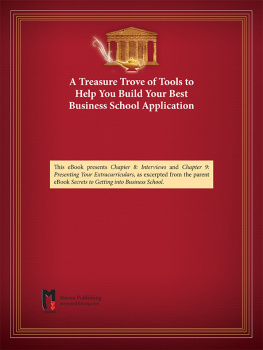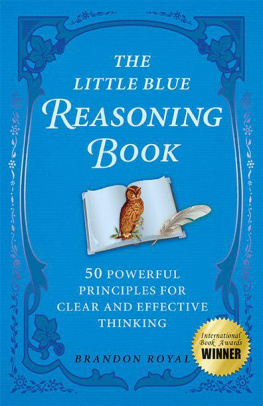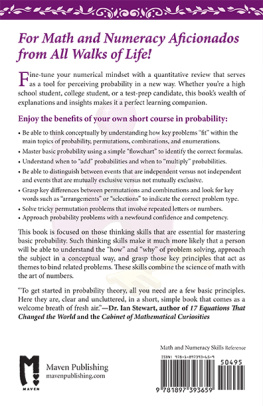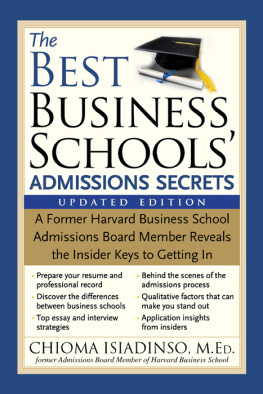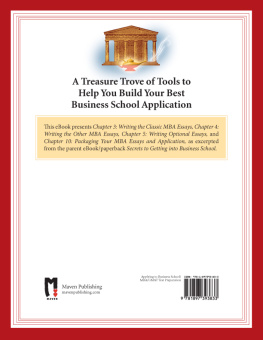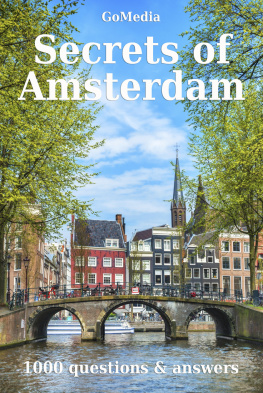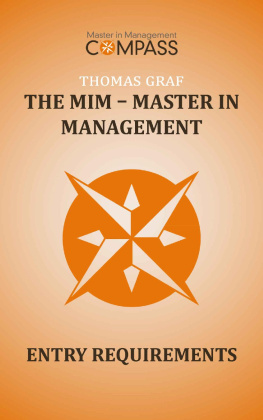Brandon Royal - MBA Admissions: Interviews and Extracurriculars
Here you can read online Brandon Royal - MBA Admissions: Interviews and Extracurriculars full text of the book (entire story) in english for free. Download pdf and epub, get meaning, cover and reviews about this ebook. year: 2011, publisher: Maven Publishing, genre: Romance novel. Description of the work, (preface) as well as reviews are available. Best literature library LitArk.com created for fans of good reading and offers a wide selection of genres:
Romance novel
Science fiction
Adventure
Detective
Science
History
Home and family
Prose
Art
Politics
Computer
Non-fiction
Religion
Business
Children
Humor
Choose a favorite category and find really read worthwhile books. Enjoy immersion in the world of imagination, feel the emotions of the characters or learn something new for yourself, make an fascinating discovery.
- Book:MBA Admissions: Interviews and Extracurriculars
- Author:
- Publisher:Maven Publishing
- Genre:
- Year:2011
- Rating:3 / 5
- Favourites:Add to favourites
- Your mark:
- 60
- 1
- 2
- 3
- 4
- 5
MBA Admissions: Interviews and Extracurriculars: summary, description and annotation
We offer to read an annotation, description, summary or preface (depends on what the author of the book "MBA Admissions: Interviews and Extracurriculars" wrote himself). If you haven't found the necessary information about the book — write in the comments, we will try to find it.
This eBook presents Chapter 8: Interviews and Chapter 9: Presenting Your Extracurriculars, as excerpted from the parent eBook Secrets to Getting into Business School.
Brandon Royal: author's other books
Who wrote MBA Admissions: Interviews and Extracurriculars? Find out the surname, the name of the author of the book and a list of all author's works by series.
MBA Admissions: Interviews and Extracurriculars — read online for free the complete book (whole text) full work
Below is the text of the book, divided by pages. System saving the place of the last page read, allows you to conveniently read the book "MBA Admissions: Interviews and Extracurriculars" online for free, without having to search again every time where you left off. Put a bookmark, and you can go to the page where you finished reading at any time.
Font size:
Interval:
Bookmark:
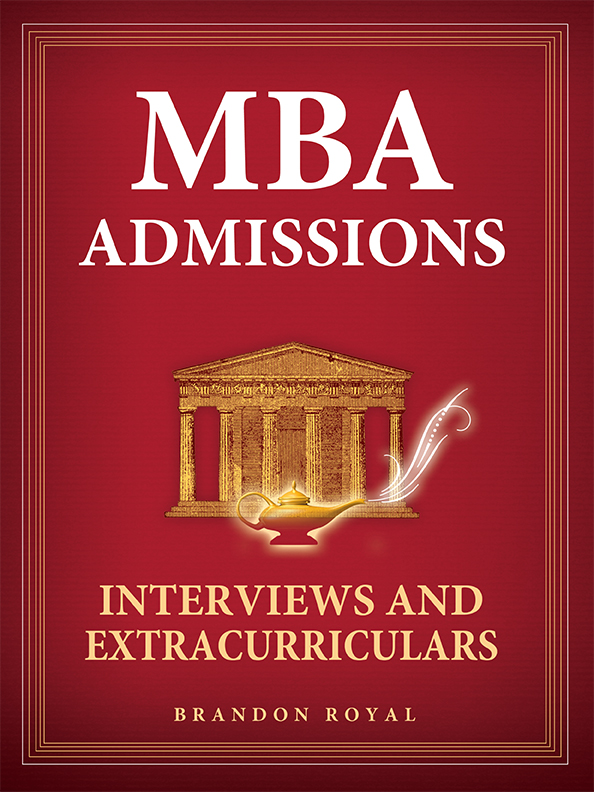
2011 by Brandon Royal
All rights reserved. No part of this work may be reproduced or transmitted in any form or by any means, electronic or mechanical including photocopying, recording or any information storage and retrieval system without permission in writing from the author or publisher.
Published by:
Maven Publishing
4520 Manilla Road
Calgary, Alberta, Canada T2G 4B7
www.mavenpublishing.com
Correspondence Address in Asia:
GPO Box 440
Central, Hong Kong
ISBN 978-1-897393-88-8 eBook
This eBook contains Chapter 7: Interviews and Chapter 8: Presenting Your Extracurriculars , as excerpted from the parent eBook Secrets to Getting into Business School . This work is also available in the Adobe PDF file format.
Technical Credits:
Cover Design: George Foster, Fairfield, Iowa, USA
Editing: Rosa Cays, Tempe, Arizona, USA
GMAT is a registered trademark of the Graduate Management Admission Council, which neither sponsors nor endorses this product.
Contents
Introduction
Twelve things to do for your business school interviews
Interview policies at leading business schools
Introduction
Two tips for presenting extracurriculars
Sample presentations
Chapter 8
Interviews
Poised, confident, knowing.
Motto of the perfectly prepared
interview candidate
Introduction
Interviews can be a potential variable in the MBA application process. Interviews are, depending on the school, either required for admissions, encouraged but not required, or simply not part of the normal admissions process. That said, virtually all top business schools in the U.S., Canada, Europe, and Asia require interviews in order for candidates to be accepted. See exhibit 8.4.
Why do schools interview? This is similar to the questions: Would you hire a person on the basis of his or her rsum alone? Would you agree to marry another person on the sole basis of biographical information? Sometimes the reason given for interviewing is, To (try to) avoid false positives and false negatives. A false positive translates to, We accepted you (positive), but when you arrived at the school and we met you, youre not the person we thought you were. A false negative translates to, We rejected you (negative), but you turned out to be the businessman or businesswoman of the century. Both of these mistakes are embarrassing for a business school.
In cases where the interview is required, most schools follow the policy of offering interviews to a pre-selected number of applicants based on an initial review of their application packages. Schools will then make a final review of an applicants application package along with interview results and make final selections. To illustrate the process with some very simple numbers, a competitive business school will reject 50 percent of the applicants based on an initial review of their applications and offer interviews to the remaining 50 percent of the applicants. The school will then accept approximately half those applicants who interview, with a resulting acceptance rate hovering around 25 percent. For schools that have acceptance rates below 25 percent, these schools will either offer interviews to fewer students or accept a corresponding smaller percentage of those students who have completed interviews. Following a policy of making initial cuts allows business schools to interview virtually everyone who is admitted since only selected applicants are granted interviews. The substantial number of applications received at top-tier business schools is a major reason behind the current popularity of this policy. Nowadays, it is virtually impossible for schools to allow every prospective applicant a chance to interview.
Do not forget to schedule your interview well in advance (in the case that the interview is optional and you wish to interview) by contacting the admissions office of your selected schools, especially if you are working overseas. Waiting until the last minute will only help delay your application. Also, as a general strategy, try to interview first at schools that are not your first or second choice best schools second, lesser schools first as you will invariably get better at interviewing through practice. Remember to send thank-you letters to your interviewers.
Should I interview?
Given the option, the decision to interview pivots on whether you feel you can favorably advance your overall chance for admission. If you do not feel you can present yourself as a stronger applicant compared with the application package you have sent or are sending to a school, then it may be best not to interview. In this case, sit at home and let your application do the work for you. If you feel, however, that your paper application is weaker than you the person behind that application and you can articulate this, then by all means get out and get an interview and make an additional application to the school you are applying to.
Where do interviews take place?
Interviews, when required or encouraged by a school, may take place on campus, off-campus, or even over the phone. Off-campus interviews are carried out by alumni of each respective business school who live and work in that city. This is also true of interviews in international locales, where the interviewer is not only an alumni of the school in question, but also a member of the local business community. Occasionally, over-the-phone interviews are given particularly when it is impossible to schedule actual in-person interviews.
How are interviews structured?
Interviews may follow either a structured or an unstructured format. Business schools may have strict guidelines for interviewers to follow during the interview, as is the case when the admissions office makes a strong effort to obtain information that can be used to compare one candidate to another. Exhibit 8.1 is modeled on an actual interview evaluation form used by a top school. It requires their interviewers to fill out an interview form by rating the interviewee from 1 (low) to 5 (high) over five categories including personal presentation, maturity, motivation, self-confidence, and communication skills. Regardless of the structure of the interview, the ultimate question from the perspective of an alumni interviewer is, Would I like this person to have the same degree from the same school as I do?
Four interviewing points that are always worth adhering to include:
- Do be on time for your interview.
- Do dress conservatively.
- Do not tell jokes (but its okay to laugh at them).
- Do not get opinionated (remember the interviewer is always right).
Twelve Things to Do for Your Business School Interviews
What twelve things do you need to do to prepare for your business school interviews? Different schools look for different things, and individual interviewers may use different interviewing techniques. In general though, you, as an interviewee, need to have a good handle on what your career goals are, why you want an MBA, and why the particular business school you are interviewing for is a good match for you.
- Review the schools website.
- If you know who your interviewer will be, learn as much about them as you can.
- Be able to defend every line of your rsum in the event an interviewer asks about it.
- Be able to articulate to your career goals and career vision.
- Be prepared to define and/or contrast the terms leadership and management.
- Be able to articulate the advantages and disadvantages of the case-study method versus the lecture method.
- Practice with mock interview questions.
- Relax and be yourself.
Font size:
Interval:
Bookmark:
Similar books «MBA Admissions: Interviews and Extracurriculars»
Look at similar books to MBA Admissions: Interviews and Extracurriculars. We have selected literature similar in name and meaning in the hope of providing readers with more options to find new, interesting, not yet read works.
Discussion, reviews of the book MBA Admissions: Interviews and Extracurriculars and just readers' own opinions. Leave your comments, write what you think about the work, its meaning or the main characters. Specify what exactly you liked and what you didn't like, and why you think so.

